|
In the Magic: The Gathering card game, trading cards originate from sealed product such as booster boxes and preconstructed decks for Commander. Once trading cards are obtained from various sealed product, they can be traded and sold among players (and businesses). A secondary market exists in the Magic: The Gathering card game where players buy and sell individual trading cards. The value for an individual card is determined by demand, supply, rarity, tournament results, and other factors. The market prices for single cards can fluctuate daily. Online vendors and selling platforms such as TCGPlayer, Card Kingdom, Star City Games, and Ebay can have a predominate impact on a card's supply availability. In addition, a number of popular MTG related websites use pricing from TCGPlayer to determine a card's market value. A potential result of this relationship is when the market price rises for a single card on TCGPlayer, the price may also increase on other websites. Vendors may react to a price increase across multiple websites by raising their selling prices as well. The interconnectivity of MTG card prices, along with supply availability, enables the possibility of large price swings. What is a Buyout? A buyout is when all available (on the Internet) copies of an individual card are bought by one or multiple individuals in a short period of time. Typically, this action is taken to increase the price of a particular card by limiting the supply availability. There are multiple reasons and scenarios a buyout could occur. One example of a potential buyout is when a speculator notices the price of an individual card is undervalued relative to its demand. The speculator could buyout all copies of a specific card and then re-sell them after the price increases. 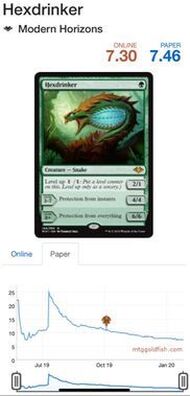 Hexdrinker pricing Hexdrinker pricing Example of a Previous Buyout: Hexdrinker The Modern Horizons MTG set was released on June 14th, 2019. This set contains a mythic card named Hexdrinker. Upon release of MH, Hexdrinker's price was around $10.00 in paper form. According to MTGGoldfish, Hexdrinker increased in price to $25.00 on July 11th, 2019. The result of this rapid price movement was due to individuals buying all available copies of the card. The Hexdrinker price graph on MTGGoldfish shows when the buyout occurred. One week later, the price of Hexdrinker dropped to around $21.00. By August 2019, the price had fallen further to $16.00. The constant decline in price following the buyout was likely due to the lack of demand for Hexdrinker at a higher price point. However, Hexdrinker did not return to its pre-buyout price until October 2019. There was a period where individuals who purchased or obtain copies prior to the buyout could sell them for a profit. Analyzing a Recent Buyout Attempt: Zo-Zu, The Punisher Zo-Zu, The Punisher is a MTG card that saw its first printing in the Champions of Kamigawa set. A reprint of the card is included in the Duel Decks: Mind vs. Might product from Spring 2017. While not a popular card, Zo-Zu sees fringe play in Commander and various constructed formats. On December 22nd, 2019, I noticed supply levels were low for Zo-Zu across both printings. The TCGPlayer market price was $3.27 for the Duel Decks version with 14 copies available. The lowest price for a near mint copy on TCGPlayer was $3.46 plus shipping. The pricing graph on MTGGoldfish showed that the Duel Decks version had started to increase in price after the release of Throne of Eldraine. In addition, the card had a negative spread on buylists. When a card on MTGGoldfish has a negative spread, it is usually a good indicator for an arbitrage opportunity. I suspected this card was targeted for a buyout due to the low supply availability and erratic price movement. While checking for other Duel Decks copies on the Internet, I found 18 for sale on Amazon at $1.35 each ($1.40 after shipping). I immediately purchased all available copies and received 17 out of 18. The day after I purchased multiple Duel Decks copies of Zo-Zu on Amazon.com, the price on MTGGoldfish rose $0.07 to $3.28. I tried to sell some of my copies on Ebay as a set of four. The price I listed was $11.49 including free shipping. I was unable to sell them as a set, even after lowering my listed price to $11.00. Ultimately, I buylisted the copies for cash at $1.75 each. My net profit from the transaction was $5.95 for a 25% gain. The price for Zo-Zu on MTGGoldfish had risen to $4.00 by the time I sold out. While my purchase of the card may have driven the price higher, it is doubtful I was the only person buying copies. The supply availability still remained low at the end of January 2020. I believe one of the reasons why I was unable to sell sets of Zo-Zu on Ebay is because players predominately use one copy in decks. Buylisting the 17 copies was likely my best exit strategy from the beginning. I could have sold individual copies for around $2.75, but shipping and selling fees made this decision less appealing. When individual cards are bought out, there is not always enough demand to maintain an elevated price. When this happens, the price will continue falling over a period of time until it stabilizes. In addition, players may list their personal copies for sale to take advantage of the increased market price. These additional copies add new supply to the market. As an example, I sold a Jace, Vryn's Prodigy from Magic Origins for $36.00 after the Pioneer format was announced in October, 2019. Jace, Vyrn's Prodigy is currently priced at $28.49 on MTGGoldfish as of January 30th, 2020. The window of opportunity between a price spike and a subsequent decline can vary by the individual card buyout. There is risk in missing the window of opportunity to rake in a profit. In closing, here are a few examples of individual card buyouts and their price curves over time from MTGGoldfish. *The information in this article is of my own knowledge and opinion. It is meant for informational purposes only. I am not a registered financial professional or trying to act as one.* Comments are closed.
|
Follow me
on Instagram @card_knock_life Categories
All
Archives
July 2024
This website contains affiliate links
|
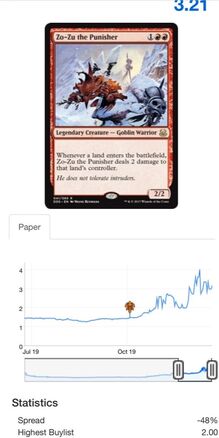
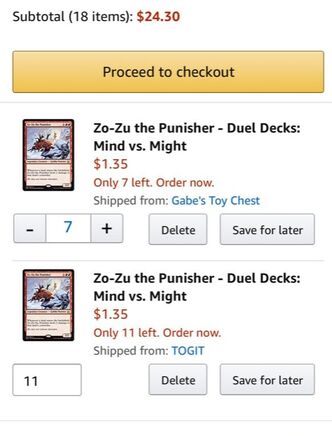
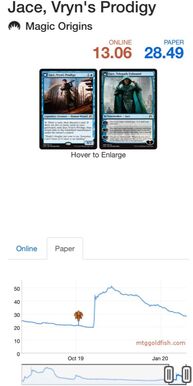
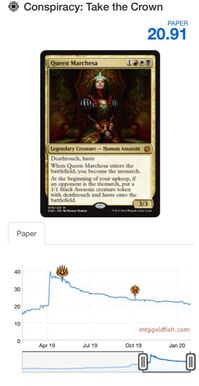
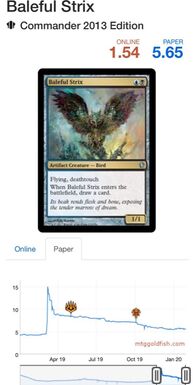
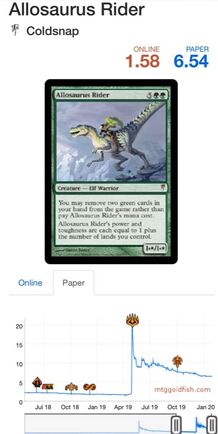
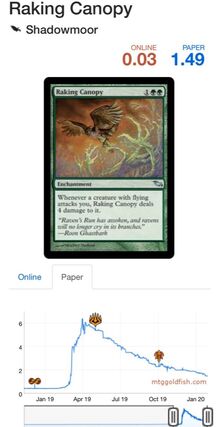
 RSS Feed
RSS Feed
